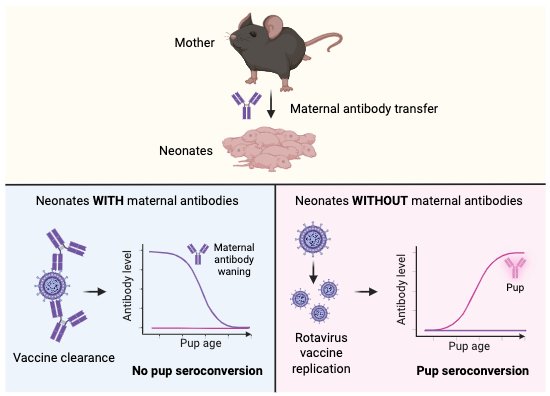-

Maternal antibody interference to rotavirus vaccination
Maternal antibodies have been known to interfere with neonatal immune responses to vaccination for decades. Using a mouse model, we have finally identified the mechanisms underpinning the interference phenomenon for oral rotavirus vaccines.
Chandler TL, Woodyear S, Chen V, Lonergan TM, Baker N, Harcourt K, Clare S, Ahmed F and Caddy S. Mechanisms of maternal antibody interference to rotavirus vaccination. EMBO J 2025, 10.1038/s44318-025-00582-2.
Thank you for Mollin and Langel for their commentary.
-

Studying antibody responses to human rotaviruses in mice
Recent work in our lab has used a chimeric human rotavirus to provide a new strategy for studying human-rotavirus-specific immunity. Rotavirus vaccines perform poorly in low-middle income countries, and we propose this small animal platform will be useful for testing the efficacy of new vaccines and antibody-based therapeutics.
Woodyear S, Chandler TL, Kawagishi T, Lonergan T, Patel V, Williams C, Permar SR, Ding S, and Caddy S. Chimeric Viruses Enable Study of Antibody Responses to Human Rotaviruses in Mice. Viruses 2024, 16(7), 1145.
-

T cell activation can be driven by antibodies
Our work has shown that antibodies can stimulate CD8 T cell activation via the intracellular antibody receptor TRIM21 to enhance MHC class I presentation.
Caddy S, Vaysburd M, Papa G, Wing M, O‘Connell K, Stoycheva D, Foss S, Terje Andersen J, Oxenius A, and James LC. Viral nucleoprotein antibodies activate TRIM21 and induce T cell immunity. EMBO J 2021 Mar 1;40(5):e106228.
An explainer of this discovery has been published by The Conversation.
Intracellular neutralisation of rotavirus by VP6-specific IgG. Caddy S, Vaysburd M, Wing M, Foss S, Terje Andersen J, O‘Connell K, Mayes K, Higginson K, Iturriza-Gómara M, Desselberger U and James LC. PLoS Pathog. 2020 Aug 4;16(8):e1008732
Reviews
Back Catalogue
-
Evidence for human norovirus infection of dogs in the UK. Caddy et al, Journal of Clinical Microbiology. 2015 Jun;53(6):1873-83
Genogroup IV and VI canine noroviruses bind to histo-blood groups antigens. Caddy et al, Journal of Virology 2014 15;88(18):10377-91.
Serological evidence for multiple strains of canine norovirus in the UK dog population. Caddy et al, PLoS ONE 2013 8:e81596.
-
Sarah Caddy volunteered in Sierra Leone in 2015 during the Ebola Crisis.
Contributing author publications:
Virus genomes reveal the factors that spread and sustained the West African Ebola epidemic. Nature. 2017 Apr 20;544(7650):309-315
Genotypic anomaly in Ebola virus strains circulating in Magazine Wharf area, Freetown, Sierra Leone, 2015. Euro Surveill. 2015 Oct 8;20(40)
-
Editorials
Developing a vaccine for covid-19. BMJ 2020;369
Russian SARS-CoV-2 vaccine. BMJ. 2020;370
Contributing author publications
A functional assay for serum detection of antibodies against SARS-CoV-2 nucleoprotein. EMBO J. 2021 Sep 1;40(17):e108588
Rapid implementation of real-time SARS-CoV-2 sequencing to investigate healthcare-associated COVID-19 infections. Lancet Infectious Diseases 2020. Nov;20(11):1263-1272.
-
First Directly-sequenced Genome from the Serum of a Patient from United Kingdom. Genome Announcements. Sep 2016 15;4(5)
Detection of serum antibodies to Hepatitis E Virus in dogs in the UK. PLoS One 2015 Jun 15;10(6):e0128703
-
Complete genome sequence of canine astrovirus with molecular and epidemiological characterisation of UK strains. Caddy S and Goodfellow, I. Veterinary Microbiology. 2015 May 15;177(1-2):206-13


